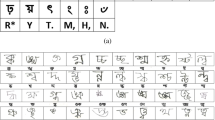Summary
Acquired dyslexia of Kanji characters is one of the most interesting research areas in neuropsychology. Although dyslexia of alphabets is known as the malfunction of the gyrus angularis (classical hypothesis), reading and writing of Chinese characters (Kanji characters) are intact in Japanese patients who suffered from cerebral infarction of the gyrus angularis. Thus, it has been pointed out that another group of neurons that integrates shape information should play an important role in recognition of Kanji characters (Iwata’s model). In this chapter, two neural network models, based on the classical hypothesis and Iwata’s model, are introduced to examine the validity of these two hypotheses. The computational experiments give the following three results: (i) Iwata’s model learns Kanji characters much faster than the classical model; (ii) Iwata’s model is more robust with respect to the malfunction of neurons; (iii) Iwata’s model simulates the characteristics of the two types of Japanese dyslexia.
Access this chapter
Tax calculation will be finalised at checkout
Purchases are for personal use only
Preview
Unable to display preview. Download preview PDF.
Similar content being viewed by others
Reference
L.W. Barsalou. Perceptual symbol systems.Behavioral and Brain Sciences22: 577–660, 1999.
J. Dejerine. Sur un cas de cécité verbale avec agraphie, suivi d’autopsie.Comptes rendus de la Société de biologie43: 197–201, 1891.
P. Gardenfors.Conceptual Spaces.MIT Press, Cambridge, MA, 2000.
N. Geschwind. Disconnexion syndromes in animals and man.Brain88: 237–294, 585–644, 1965.
M. Iwata. Neural mechanism of reading and writing in the Japanese language.Functional Neurology1: 43–52, 1986.
M. Kawamura, K. Hirayama, K. Hasegawa, N. Takahashi, A. Yamaura. Alexia with agraphia of Kanji (Japanese morphograms).Journal of Neurology Neurosurgery and Psychiatry50: 1125–1129, 1987.
J. McClelland, D. Rumelhart, et al., editors.Parallel Distributed Processing.MIT Press, Cambridge, MA, 1986.
J. Reggia, R.S. Berndt, C.L. D’Autrechy. Connectionist models in neuropsychology. In F. Boller, J. Grafman, editorsHandbook of NeuropsychologyVol. 9, 297–333, Elsevier, Amsterdam, 1994.
L.A. Zadeh. A new direction in AI: Toward a computational theory of perceptions.AI Magazine22(1): 73–84, 2001.
Author information
Authors and Affiliations
Editor information
Editors and Affiliations
Rights and permissions
Copyright information
© 2004 Springer-Verlag Berlin Heidelberg
About this chapter
Cite this chapter
Tsumoto, S. (2004). Computational Analysis of Acquired Dyslexia of Kanji Characters Based on Conventional and Rough Neural Networks. In: Pal, S.K., Polkowski, L., Skowron, A. (eds) Rough-Neural Computing. Cognitive Technologies. Springer, Berlin, Heidelberg. https://doi.org/10.1007/978-3-642-18859-6_26
Download citation
DOI: https://doi.org/10.1007/978-3-642-18859-6_26
Publisher Name: Springer, Berlin, Heidelberg
Print ISBN: 978-3-642-62328-8
Online ISBN: 978-3-642-18859-6
eBook Packages: Springer Book Archive




